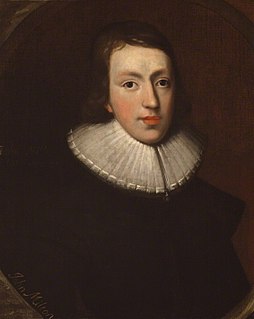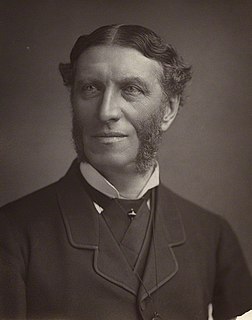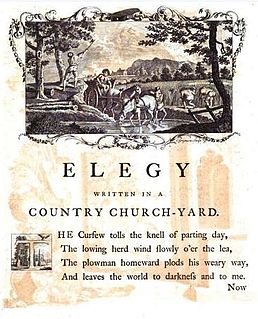
John Milton was an English poet and intellectual who served as a civil servant for the Commonwealth of England under its Council of State and later under Oliver Cromwell. He wrote at a time of religious flux and political upheaval, and is best known for his epic poem Paradise Lost (1667). Written in blank verse, Paradise Lost is widely considered one of the greatest works of literature ever written.

Thomas Gray was an English poet, letter-writer, classical scholar, and professor at Pembroke College, Cambridge. He is widely known for his Elegy Written in a Country Churchyard, published in 1751.

Sir William Empson was an English literary critic and poet, widely influential for his practice of closely reading literary works, a practice fundamental to New Criticism. His best-known work is his first, Seven Types of Ambiguity, published in 1930.

Alexander Pope was an English poet, translator, and satirist of the Enlightenment era who is considered one of the most prominent English poets of the early 18th century. An exponent of Augustan literature, Pope is best known for his satirical and discursive poetry including The Rape of the Lock, The Dunciad, and An Essay on Criticism, and for his translation of Homer.

Samuel Johnson, often called Dr Johnson, was an English writer who made lasting contributions as a poet, playwright, essayist, moralist, critic, biographer, editor and lexicographer. He was a devout Anglican, and a committed Tory. The Oxford Dictionary of National Biography calls him "arguably the most distinguished man of letters in English history". James Boswell's Life of Samuel Johnson was selected by Walter Jackson Bate as "the most famous single work of biographical art in the whole of literature".

John Dryden was an English poet, literary critic, translator, and playwright who was appointed England's first Poet Laureate in 1668.

Matthew Arnold was an English poet and cultural critic who worked as an inspector of schools. He was the son of Thomas Arnold, the celebrated headmaster of Rugby School, and brother to both Tom Arnold, literary professor, and William Delafield Arnold, novelist and colonial administrator. Matthew Arnold has been characterised as a sage writer, a type of writer who chastises and instructs the reader on contemporary social issues. He was also an inspector of schools for thirty-five years, and supported the concept of state-regulated secondary education.
Poetry analysis is the process of investigating a poem's form, content, structural semiotics and history in an informed way, with the aim of heightening one's own and others' understanding and appreciation of the work.

Thomas Warton was an English literary historian, critic, and poet. He was appointed Poet Laureate in 1785, following the death of William Whitehead (poet). He is sometimes called Thomas Warton the younger to distinguish him from his father Thomas Warton the elder. His most famous poem is The Pleasures of Melancholy, a representative work of the Graveyard poets.

The term Metaphysical poets was coined by the critic Samuel Johnson to describe a loose group of 17th-century English poets whose work was characterised by the inventive use of conceits, and by a greater emphasis on the spoken rather than lyrical quality of their verse. These poets were not formally affiliated and few were highly regarded until 20th century attention established their importance.
William Kurtz Wimsatt Jr. was an American professor of English, literary theorist, and critic. Wimsatt is often associated with the concept of the intentional fallacy, which he developed with Monroe Beardsley in order to discuss the importance of an author's intentions for the creation of a work of art.
In Latin literature, Augustan poetry is the poetry that flourished during the reign of Caesar Augustus as Emperor of Rome, most notably including the works of Virgil, Horace, and Ovid. In English literature, Augustan poetry is a branch of Augustan literature, and refers to the poetry of the 18th century, specifically the first half of the century. The term comes most originally from a term that George I had used for himself. He saw himself as an Augustus. Therefore, the British poets picked up that term as a way of referring to their endeavours, for it fit in another respect: 18th-century English poetry was political, satirical, and marked by the central philosophical problem of whether the individual or society took precedence as the subject of the verse.

Lives of the Most Eminent English Poets (1779–81), alternatively known by the shorter title Lives of the Poets, is a work by Samuel Johnson comprising short biographies and critical appraisals of 52 poets, most of whom lived during the eighteenth century. These were arranged, approximately, by date of death.

Elizabethan literature refers to bodies of work produced during the reign of Queen Elizabeth I (1558–1603), and is one of the most splendid ages of English literature. In addition to drama and the theatre, it saw a flowering of poetry, with new forms like the sonnet, the Spenserian stanza, and dramatic blank verse, as well as prose, including historical chronicles, pamphlets, and the first English novels. Major writers include William Shakespeare, Edmund Spenser, Christopher Marlowe, Richard Hooker, Ben Jonson, Philip Sidney and Thomas Kyd.

Elegy Written in a Country Churchyard is a poem by Thomas Gray, completed in 1750 and first published in 1751. The poem's origins are unknown, but it was partly inspired by Gray's thoughts following the death of the poet Richard West in 1742. Originally titled Stanzas Wrote in a Country Church-Yard, the poem was completed when Gray was living near St Giles' parish church at Stoke Poges. It was sent to his friend Horace Walpole, who popularised the poem among London literary circles. Gray was eventually forced to publish the work on 15 February 1751 in order to preempt a magazine publisher from printing an unlicensed copy of the poem.

The Well Wrought Urn: Studies in the Structure of Poetry is a 1947 collection of essays by Cleanth Brooks. It is considered a seminal text in the New Critical school of literary criticism. The title contains an allusion to the fourth stanza of John Donne's poem, "The Canonization", which is the primary subject of the first chapter of the book.
Literature written in the English language includes many countries such as the United Kingdom and its crown dependencies, Republic of Ireland, the United States, and the countries of the former British Empire. The English language has developed over the course of more than 1,400 years. The earliest forms of English, a set of Anglo-Frisian dialects brought to Great Britain by Anglo-Saxon invaders in the fifth century, are called Old English. Beowulf is the most famous work in Old English, and has achieved national epic status in England, despite being set in Scandinavia. However, following the Norman conquest of England in 1066, the written form of the Anglo-Saxon language became less common. Under the influence of the new aristocracy, French became the standard language of courts, parliament, and polite society. The English spoken after the Normans came is known as Middle English. This form of English lasted until the 1470s, when the Chancery Standard, a London-based form of English, became widespread. Geoffrey Chaucer, author of The Canterbury Tales, was a significant figure in the development of the legitimacy of vernacular Middle English at a time when the dominant literary languages in England were still French and Latin. The invention of the printing press by Johannes Gutenberg in 1439 also helped to standardise the language, as did the King James Bible (1611), and the Great Vowel Shift.

Harold Bloom was an American literary critic and the Sterling Professor of Humanities at Yale University. In 2017, Bloom was described as "probably the most famous literary critic in the English-speaking world." Following the publication of his first book in 1959, Bloom wrote more than 50 books, including over 40 books of literary criticism, several books discussing religion, and a novel. During his lifetime, he edited hundreds of anthologies concerning numerous literary and philosophical figures for the Chelsea House publishing firm. Bloom's books have been translated into more than 40 languages. Bloom was elected to the American Philosophical Society in 1995.
In romantic literature, a work has organic form if the structure has originated from the materials and subjects used by the author. Using the organic metaphor, the structure is seen to grow as a plant. It stands in contrast to a mechanical form, a work which has been produced in accordance with artificial rules. The lack of rules in Shakespeare's works led some critics to claim that they lacked form; Samuel Taylor Coleridge leapt to his defence with the concept of organic form.
Poetic devices are a form of literary device used in poetry. Poems are created out of poetic devices composite of: structural, grammatical, rhythmic, metrical, verbal, and visual elements. They are essential tools that a poet uses to create rhythm, enhance a poem's meaning, or intensify a mood or feeling.














